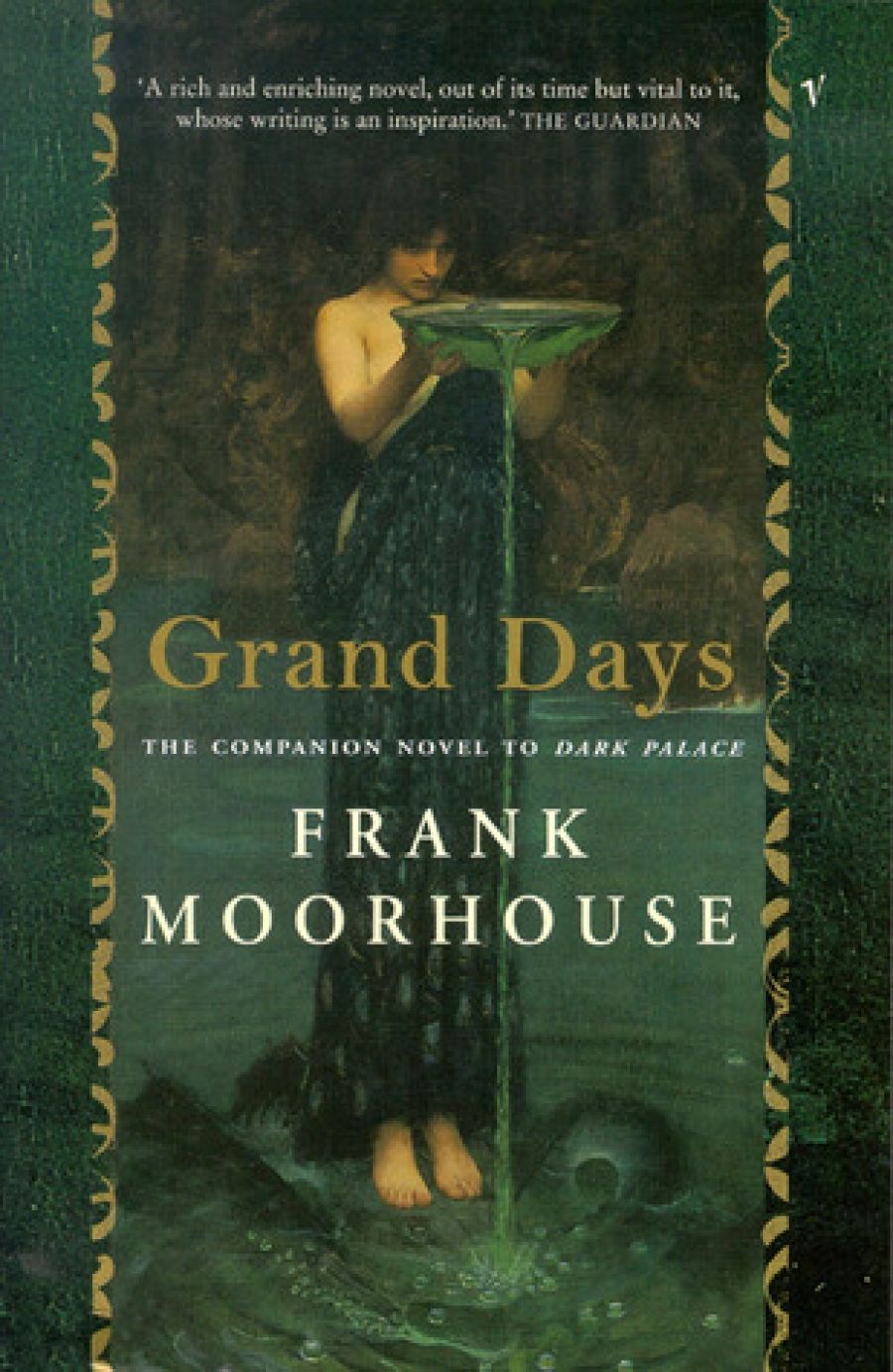
- Free Article: No
- Contents Category: Fiction
- Review Article: Yes
- Online Only: No
- Custom Highlight Text:
The faded but still brave word ‘grand’ in the title of Frank Moorhouse’s new novel gives a signal from another age, the 1920s, when after the war-to-end-all-wars there were grand ideals and grand hotels. It is also fitting that the League of Nations, the setting for the book, should in the 1920s have had its headquarters in Geneva in a former luxury hotel, while its own rather unfortunately named Palais was being built.
- Book 1 Title: Grand Days
- Book 1 Biblio: Macmillan, $35 hb
It is not always thought PC nowadays for a man to write about a woman (hide your heads, Anna, Emma, and Tess). But Moorhouse has with the utmost sympathy and subtlety created in Edith a wonderful portrait of a young Australian woman alone in Europe towards the end of the 1920s. Edith is almost the only Australian in the book, but Moorhouse makes use of all his professional skills to give her an unmistakable and very touching Australianness. Like Henry James, with whom he shares that ability to portray the delicate hesitancy of certain human relationships, Moorhouse uses a young innocent from a new country to illuminate old Europe.
‘Committees, clubs, the death of love,’ said Baudelaire. True enough, usually, but not in Grand Days. Edith is good in committees, if somewhat unorthodox at times; in love she is surprisingly good, and sometimes very unorthodox indeed. One of Moorhouse’s great strengths in this big, strong novel is that he is not only very knowledgeable about committees and conferences but actually enjoys them, as Edith does. In relation to this book, it’s worth remembering that Moorhouse has done a great deal for Australian writers by years of patient work on committees involved with Public Lending Right, copyright, and the Society of Authors.
Maybe this sounds admirable but a recipe for dryness. Not a bit of it. Moorhouse is definitely not C.P. Snow. He has always been good at suggesting the machinations of planning and structuring, the layers of power, the top dogs, and the dogsbodies. In his Geneva, the corridors of power (which, basic irony of the book, are not interested in real power) are rich with human beings. Edith responds to them with respect and suspicion and sometimes affection, even love; she is also seldom immune from a giggle.
Moorhouse’s great originality in this book is to take a huge, unused framework and story, that of the League, and let loose in it a riveting personal history. Edith plays games. They are not the sharp moves of experience, but games to shield and release the vulnerable, emerging character of this young Australian. Sometimes she hesitates, to assess the possibilities of doing nothing or acting. Sometimes she plunges in. Coming from the ‘real’ place of Australia, she says she now needs to make herself ‘productively nervous’.
By the time she is thinking this, almost halfway through the book, her impetuosity has led her into startling and sometimes dangerous situations, both sexual and political. Moorhouse’s sexual scenes, in all their variety, are not salacious; this is because they are linked to Edith’s character, to her impetuous joyfulness, her curiosity and her generosity. She does do some things that would shake her good Rationalist parents back in Sydney: how could their well-brought-up, highly educated daughter be doing such peculiar things with a British officer of the League, a black jazz musician, or an American woman involved in the armaments racket?
But they would also have been very proud of her courage, on several occasions, especially when confronting a mob which is rioting in staid Geneva on the night Sacco and Vanzetti died. It is very difficult for a novelist to create a character who can command respect without making her or him respectable. Moorhouse passes this test triumphantly.
The setting of the book in Geneva is, of course, historically inevitable. But Geneva itself is, and was, by no means only the neat, white city by the lake. The city of Calvin is above all that of Rousseau; yet there was Voltaire, ten kilometres away at Perney, and Mme de Stael a little further on. As well as clockmakers, there was a host of famous scientists. There was always a dark underside, and Edith, trained as a scientist, has also to learn about that. The spirit of Weimar, of 1920s anything goes, has reached Geneva, and so has the growth of fascism; the two come together in a transvestite nightclub in one of the most powerful scenes in the novel.
Moorhouse has for a long time been one of the most original and professional of Australian writers in the world of literature in English. Grand Days, all 500-odd pages of it, is the summit of this achievement.


Comments powered by CComment